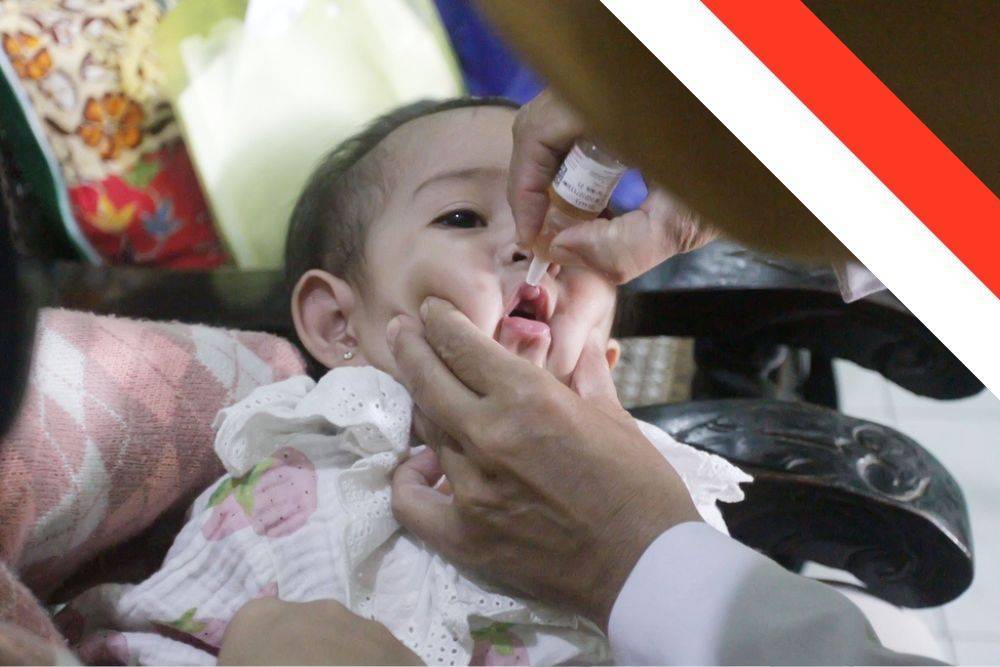The Ministry of Health (Kemenkes) reports an increase in cases of childhood paralysis due to polio in Indonesia.
Since the beginning of 2022, 12 cases of paralysis have been recorded in eight provinces, caused by poliovirus types two and one.
Chronology of Cases in Indonesia
According to Dr Yudhi Pramono, Acting Director General of Disease Prevention and Control (P2P) at the Ministry of Health, several outbreaks have occurred since late 2022. These cases are still active, with new cases being reported. Polio has spread in Aceh, West Java, Central Java, East Java, Central Papua, Mountainous Papua, South Papua, and Banten.
Case Distribution:
Aceh: 3 cases
West Java: 1 case
Central Java: 1 case
East Java: 2 cases
Central Papua: 1 case
Mountainous Papua: 1 case
South Papua: 2 cases
Banten: 1 case
Dr Yudhi mentioned that these cases were discovered through intensive surveillance by the Ministry of Health. Surveillance and early detection are crucial steps in polio management.
Prevention and Management Efforts by the Ministry of Health
The Ministry of Health also found 32 polio-positive children in good health. To address this issue, the Ministry of Health targets polio eradication by 2026 through an additional immunisation programme known as National Immunisation Week.
Polio Immunisation Program (PIN) and its Effectiveness
PIN is a mass vaccination programme that aims to increase immunisation coverage across Indonesia. The programme involves various parties, including local governments, health workers and communities, and is supported by international organisations such as WHO and UNICEF.
The programme will be implemented in two phases:
Phase One: It will firstly start on 27 May 2024 in the provinces of Papua, Central Papua, South Papua, Papua Mountains, West Papua, and Southwest Papua.
Phase Two: Starting on 23 July 2024 in 27 other provinces, including West Sumatra, DKI Jakarta, Banten, and North Maluku.
The vaccine works by stimulating the immune system to produce antibodies against the virus. Two types of vaccines are used globally: oral polio vaccine (OPV) and inactivated polio vaccine (IPV). OPV contains the weakened polio virus, while IPV contains the killed virus. Both vaccines effectively protect children from polio and prevent the spread of the virus.
Stages of National Immunisation Week
The National Immunisation Week aims to build herd immunity, which is essential to stop the spread of polio. According to the World Health Organisation (WHO), the Global Polio Eradication Initiative (GPEI) has reduced the incidence of polio worldwide by more than 99% since 1988. The programme targets all children aged 0-7 years, regardless of previous immunisation status.
Health Effects of Polio
Polio is an infectious disease that can cause permanent paralysis in children by attacking the central nervous system. Infection with poliovirus type two or one can impair motor skills and other vital functions. Complications include respiratory problems, secondary infections, and central nervous system disorders. Vaccination is a very important preventive measure to protect children from the risk of polio.
Importance of Vaccination
Polio vaccination is essential to prevent the spread of the virus. Polio vaccines, both OPV and IPV, are effective in building immunity and reducing the risk of infection. Additionally, with proper and systematic vaccination, new cases can be minimised, and mortality from the disease can be reduced.
Global Efforts
Polio is a global health issue that requires international cooperation. WHO aims to eradicate polio by 2026, involving countries and international organisations in vaccination campaigns and disease control. Affected countries often face challenges such as limited access to health services and low public awareness about immunisation.
International Co-operation
International cooperation is essential in polio eradication. Countries share information, resources, and experiences in dealing with outbreaks. Support from international organisations such as WHO and UNICEF helps implement immunisation and surveillance programmes. Innovations in vaccine development and efficient distribution methods also play a key role in increasing immunisation coverage in hard-to-reach areas.
Ministry of Health Commitment
The Ministry of Health is fully committed to full eradication, with the target of being polio-free by 2026 through the PIN and mass vaccination programmes. Hence, support from the government, health workers, and communities is essential to achieving this target. Education on the importance of immunisation must also be continuously improved to protect children from the virus. Therefore, with the cooperation of all parties and sustained global efforts, Indonesia is expected to achieve this ambitious target and protect future generations from the threat of this disease.
Have a pressing question for a doctor? Medical Channel Asia has launched a community forum page where you can get questions answered by a medical specialist. Visit the community forum here.

